Aug 2014
Harbor seal pupping season in full swing in South Puget Sound
Aug/30/14 03:05 PM
 Seal Sitters has responded to 5 harbor seal pups in 5 West Seattle locations in the past week as pups leave the safety of the area’s rookeries. We are now in the midst of seal pupping season!
Seal Sitters has responded to 5 harbor seal pups in 5 West Seattle locations in the past week as pups leave the safety of the area’s rookeries. We are now in the midst of seal pupping season! On South Puget Sound’s islands, sand bars, rocky spits and log booms, rotund harbor seal pups are begging for a last drink of mom’s rich milk, almost 50% fat, before venturing off on their own. Many more have already been weaned and are now facing formidable challenges and hazards in their struggle to survive the first year of life. By August 15th, 90% of all harbor seal pups had been born in South Puget Sound (view pupping season map here). As of today, well over half of those pups have been weaned - including the pup shown above, born in Sinclair Inlet on July 2nd.
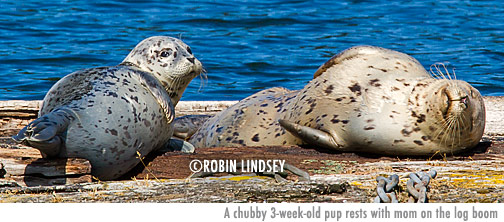
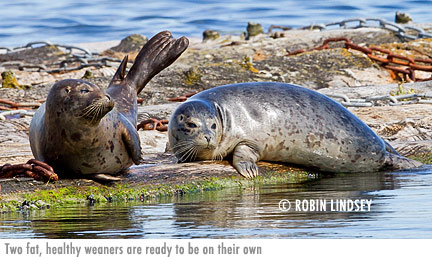
Even though seal pups learn to forage with moms near the rookery, catching fast-swimming little fish is a daunting task and some are more successful than others. Since their muscles still have not fully developed, it affects their ability to dive for long periods. As the weeks pass, their body weight can drop noticeably.
At the haul-out toward the end of the pupping season (late June through September in South Puget Sound), testosterone-laced males, intent on attracting mates, show off with aquatic displays (porpoising, tail-slapping, bubble blowing) at the water’s surface and compete for space on the haul-out. Adults become grumpy and spend many hours on land during the uncomfortable molt. Food sources can become depleted with so many seals concentrated in a small area. The idyllic world of attentive and affectionate moms is no longer so for weaners. This is the time that many of them strike out on their own, a solitary journey.
By mid-September, 90% of all harbor seal pups will be weaned in South Puget Sound. This means that by then almost every seal pup that is alone onshore has no mom nearby, waiting to nourish them. Consequently, weaners are most often thin and in a daily struggle to survive against predators, disease and malnutrition. Low body weight increases opportunities for parasites and viruses. They must conserve precious calories, so it is urgent to give them space to rest on our urban beaches.
Still, we cannot rule out that pups who are still nursing age will visit our shores as well over the next 6 or more weeks. If a mom is nearby and sees a disturbance near her pup, she will very likely abandon him - adult seals are notoriously shy and wary of people and predators.
Always stay back and keep people and dogs away from resting seals. In West Seattle, call Seal Sitters Marine Mammal Stranding Network’s hotline @ 206-905-SEAL (7325). To view a map of NOAA’s stranding networks in Washington State with contact information, click here.
Seal Sitters MMSN renews contract with NOAA
Aug/29/14 01:19 PM
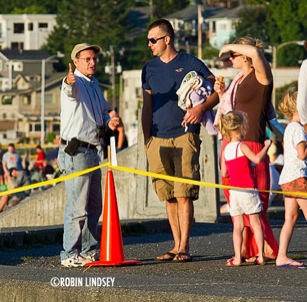
This legally binding agreement gives SSMMSN the authority to respond to marine mammals, dead and alive, along the shoreline of West Seattle from Brace Point through the Duwamish River (including Harbor Island). It gives us the jurisdiction to examine and transport marine mammals.
Seal Sitters has the authority to close down access to public areas and establish appropriate perimeters around marine mammals to ensure not only their protection, but that of the public.
All marine mammals are protected from harassment by both the Federal Marine Mammal Protection Act (punishable by fines up to $10,000 and one year in jail) and Washington State law RCW 77.15.130 (a criminal misdemeanor, mandatory court appearance, punishable with up to 90 days in jail and up to $1000 fine). In cases of disturbance or harassment (including feeding, touching, moving), SSMMSN will document infractions and turn over evidence to NOAA’s Office for Law Enforcement and Washington Department of Fish and Wildlife Enforcement for prosecution. If deemed necessary, the local police will also be contacted.
As part of our responsibility, dead marine mammals are examined and documentation is entered into NOAA’s national database. In some instances, animals may also be taken for necropsy. If a marine mammal is not a candidate for necropsy and is on public beach, SSMMSN will arrange for removal through our cooperative arrangement with Seattle Parks. If the dead animal is on private property, disposal is the responsibility of the homeowner.
Please report ALL live and dead marine mammals on both private and public beach to Seal Sitters’ hotline 206-905-SEAL (7325) so that we may help monitor the health of populations. SSMMSN does not receive any funding from local, State or Federal government and depends on donations to perform our work.
Share the Shore banners go up along Alki Beach
Aug/29/14 09:11 AM
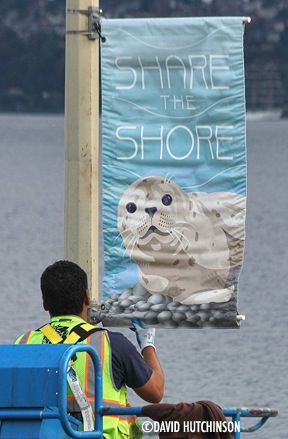
Designed to celebrate and raise awareness of the arrival of seal pups on our urban beaches, the banners are the result of an in-kind City of Seattle/Department of Neighborhoods (DON) grant which Seal Sitters secured in 2010. Artist Nancy Stahl created this beautiful illustration from a Robin Lindsey photograph of seal pup Shanti.
The graphics serve as a reminder that September and October are the height of harbor seal pupping season in South Puget Sound - and that it is not uncommon to encounter a resting pup on the beach. Pupping season is already well underway here in our area with the response over the past week to 5 seal pups on West Seattle beaches.
The 2010 and 2011 Seal Sitters’ educational outreach projects also included the installation of informational beach signage about seals and seal pups in locations across West Seattle. NOAA has since extended that beach signage across the region (and plans to extend installation to the Outer Coast of Washington). Read more here.
Many thanks to DON for the award that made this project possible - and we extend huge thanks to Seattle Department of Parks for their on-going cooperation and extreme generosity. We value our partnerships with local government.
So, please do remember to Share the Shore if you see a marine mammal on the beach and call our hotline as soon as possible at 206-905-SEAL (7325).
Sad and unexpected outcome for Beach Drive seal pup
Aug/24/14 07:54 PM
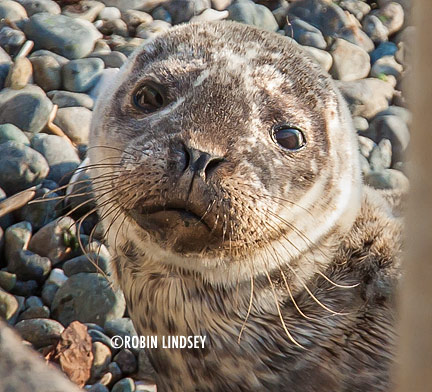
Seal Sitters volunteers are still reeling from an unexpected turn of events at Emma Schmitz Park yesterday. Late Saturday afternoon, just before high tide, a seal pup came ashore at the park’s small pocket beach located below Beach Drive - a beach notorious (as are too many in West Seattle) for illegally off-leash dogs.
Upon arrival, our first responder thanked the reporting party who called the hotline and had even posted some handmade signs warning people that a seal pup was resting there. The next order of business was to cordon off access to a small section of the sidewalk that runs along the seawall and opens onto the beach. With only a few feet of beach to rest upon, the tired pup snuggled right up against the cement entryway - barely visible.
The dark-coated pup was thin, but alert and stretched and yawned in typical seal pup fashion. Then, the pup zonked out for a snooze. Over the next 5-plus hours on this beautiful evening, there were many people out and about - walkers, bikers, paddleboarders - all of them thrilled to learn about the tiny, exotic visitor who would occasionally peer up, curious about the strange and excited 2-legged creatures on the sidewalk high above him.
Late in the evening, after darkness fell and the crowds dispersed, our volunteers reluctantly left for home. The pup, nicknamed H2Otis, was sleeping peacefully on the now expansive beach and we hoped he’d be safe throughout the night.
At 5:30am, Seal Sitters’ first responder was back to check on the pup. H2Otis was sound asleep - that is, until the noise of the early morning garbage truck caused him to stir and look about. A quick yawn and he was back asleep, still nestled against the wall.
It’s not unusual for a seal pup, particularly a thinner one, to spend many hours on shore before returning to the water. And so, H2Otis spent the entire morning there. We had no reason for particular concern for his health - other than needing to pack on some pounds - because he exhibited no symptoms of distress. Around noon, he made a decisive move toward the Sound and we were relieved that he was returning to forage. A pup coming and going from the water is a good sign.
However, after resting for some time halfway to the water’s edge, he started his trek again, but began having seizures. We realized something was horribly wrong. Plans were quickly put into place for a rescue. A call was placed to PAWS Wildlife Center in Lynnwood to make sure they could accept him for treatment. First responders examined the pup, but he was largely unresponsive. PAWS recommended we bring him in for humane euthanasia (if necessary). There was very little hope he could survive, but we did not want him to suffer, potentially for hours, in the hot sun on the beach.
Sadly, H2Otis died en route to the rehab facility. PAWS’ initial exam revealed that H2Otis had multiple small puncture wounds - animal bites - to the head, tongue and rear flipper. These wounds were not noticeable Saturday evening or Sunday morning because of his dark brown coat and lack of blood. Upon closer examination of photos taken in poor and contrasty light on Saturday, faint indications of small wounds can be seen at high magnification. His positioning against the wall made health assessment photos difficult to obtain. So, it appears that he was attacked before Seal Sitters’ response late Saturday afternoon. We want to stress that we do not know when, where or by what species H2Otis was attacked.
PAWS will perform a necropsy on the male pup to try to determine what species of animal attacked him. It will also help to establish if the wounds were the cause of death or if there were other underlying health issues that were asymptomatic. Thanks so much to PAWS’ staff for offering to necropsy the pup. We will update with the findings as soon as they become available.
We are just heartbroken and stunned by this unforeseen outcome. Seal Sitters volunteers and a respectful public can take solace in the fact that we gave H2Otis peace from harassment and disturbance these last hours of his life. This was our privilege and gift to him. He, in turn, gave us a gift that cannot be put into words.
This is a reminder to everyone that each day is a struggle to survive for harbor seal pups, who have a 50% mortality their first year. Always keep your dog leashed near the beach - even the most well-behaved dog can be unpredictable and dangerous to seals. Please Share the Shore - stay back if you see a pup on the beach and call Seal Sitters MMSN @ 206-905-SEAL (7325).
UPDATE: NECROPSY RESULTS 8/26/14
Yesterday, a full necropsy was performed on seal pup H2Otis at PAWS Wildlife Center. Unfortunately, it was inconclusive what species of animal inflicted the numerous bite wounds on the pup. It appears, however, that the punctures were not the cause of death. The male pup was in much worse body condition than anyone realized, with little fat store and no food in his system. It is believed the seizures were caused by hypoglycemia.
3 seal pups in 3 days as pupping season hits our urban shores
Aug/23/14 09:01 AM
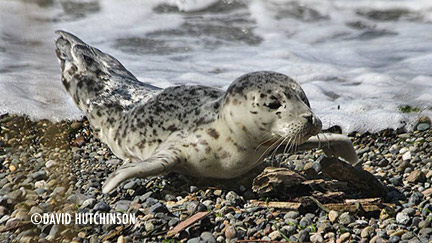
Unlike sea lions, harbor seals can’t rotate their rear flippers to aid in locomotion on land. Though highly acrobatic in the water, they move with a caterpillar-like motion on shore and are much more vulnerable as they seek rest and try to warm up. Never return a seal pup to the water - rest is critical to their survival. Sometimes, they will shiver as they try to regulate their body temperature. This is normal. Never wrap a pup in a towel or blanket - this can cause brain damage or death. It is illegal to touch, move or feed seal pups.
Quickly arriving at the park, Seal Sitters first responders established a perimeter with tape, cones and informational signs and talked to quite a number of people who expressed both interest and support. 6-year-old Alice named the pup Adventure, who settled in for a long nap between the beach logs. Volunteers stood watch in two-hour shifts until darkness fell in the park. Thanks to all the volunteers who put in a very long day yesterday!
Our first responder sought Adventure at 6am this morning, as the pink light of dawn reflected in the still, blue waters of the Sound. Thankfully, the beach was remarkably free from the usual illegally off-leash dogs. A handful of silhouetted fishermen cast their lines in hopes of snaring of one the few remaining cohos making their way north to Admiralty Inlet. The seal pup was no longer in his log hideaway and had not been seen by the fishermen. We assume Adventure returned to the water for a late-night snack or early breakfast - perhaps from mom, but more likely he is weaned and foraging on his own.
Please call our dedicated hotline at 206-905-SEAL (7325) if you see a seal pup (or other marine mammal) on the beach. Having extra eyes on the beach from the public greatly enables Seal Sitters MMSN to give pups the sanctuary they need - and deserve - on shore.
Seal pup comes ashore to rest in West Seattle
Aug/21/14 06:08 AM
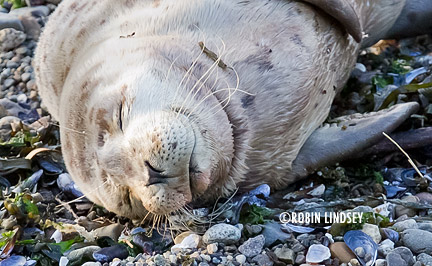
At approximately 6pm, our dedicated hotline 206-905-7325 (SEAL) rang with a report that the pup had returned again to that same small beach. The pup came ashore less than 50 feet from some people flying kites on the pebbled shore. Seal Sitters’ first responder arrived on the scene within minutes and quickly closed off access and began a health assessment through observation with binoculars. The sidewalk above the resting pup was cordoned off to lessen disturbance. The small, thin pup promptly fell asleep in the waning sunlight.
A call was placed to our volunteer scheduler for the day who checked the online calendar to see what volunteers had entered time for the evening. There she found listed brand new volunteers Laura and Chris, who enthusiastically arrived to assist in their first experience protecting a seal pup.
The park was quite busy last evening and volunteers had an opportunity to share info with a number of interested people. Among those, were 8-year old Jack and his 4-year old brother Charlie who were fascinated by the slumbering pup, who occasionally stretched and yawned , and named him Francis - after the patron saint known for protecting all animals. This little pup could use a little extra blessing to help him (or her) pack on some much-needed blubber for warmth and energy.
More than 90% of all the seal pups in South Puget Sound have been born and a high percentage are already weaned. Based on body weight and condition, we believe that Francis is most likely a weaner. However, it its difficult to estimate age without confirmation of how many teeth have erupted. Weaned at only 4-6 weeks, pups then must fend for themselves with no mom for support. It can be a difficult transition. They can lose quite a bit of weight in a short time and must turn things around quickly to avoid the 50% mortality faced in their first year.
Francis was still sleeping on the beach at 9pm and volunteers left as the Port Police came through the Park and then locked the entry gate. Seal Sitters’ first responder checked the shore at 6am this morning when the park reopened and Francis was gone - hopefully, out grabbing a big breakfast of small fish and squid! We anticipate the pup will be back on shore today, trying to rest and warm up. If you see a pup onshore, please call our hotline ASAP and stay back. Undisrupted rest is critical for all seal pups’ survival.
PUPDATE 8/22 morning
Francis came ashore briefly around 8 am, but returned to Elliott Bay. We observed a seal pup foraging offshore throughout the day, but can’t say for sure if it was indeed Francis or another pup feasting on small fish.
Rash of illegal pickups of seal pups prompts investigations
Aug/01/14 06:01 AM
Harbor seal pupping season is well underway in South Puget Sound - and virtually all outer coast and inland Washington waterways. Seal haulouts are brimming with harbor seal moms and pups. Nursing age and newly weaned pups are resting along our shorelines, both in rural and urban areas. The West Coast Marine Mammal Stranding Network across the Pacific Northwest does our best to spread the word to “leave seal pups alone”. However, each season brings with it more cases of human interference, too often with drastic consequences for the animals.
Don’t touch seal pups - it is a violation of Federal and State Law. All marine mammals are protected from harassment by both the Federal Marine Mammal Protection Act (punishable by fines up to $10,000 and one year in jail) and Washington State law RCW 77.15.130 (a criminal misdemeanor, mandatory court appearance, punishable with up to 90 days in jail and up to $1000 fine).
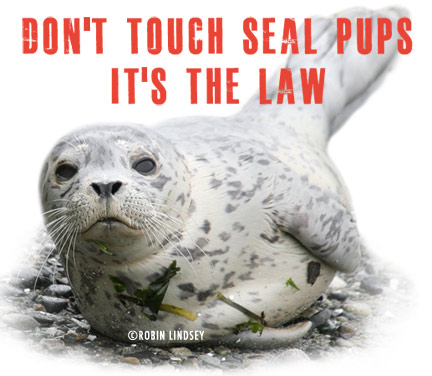 Recently, there has been a rash of illegal pickups and handling of harbor seals. In one case, a pup was wrapped in a blanket, causing him to overheat and die. In another incident, human interference caused abandonment and the pup was forced into a rehab facility.
Recently, there has been a rash of illegal pickups and handling of harbor seals. In one case, a pup was wrapped in a blanket, causing him to overheat and die. In another incident, human interference caused abandonment and the pup was forced into a rehab facility.
These cases and others are being investigated for prosecution by NOAA Office for Law Enforcement and Washington Department of Fish and Wildlife Enforcement.
COMMON MISTAKES THAT CAN RESULT IN HARM TO SEAL PUPS (AND ARE UNDER PENALTY OF LAW):
We can’t stress enough that while pups may look vulnerable alone on the beach, be assured that most likely there is no cause for alarm. If a pup is not strong enough to swim for great lengths, he sometimes rests onshore while mom observes from the waters nearby. Because there is no mom in sight does not mean the pup is abandoned. Stay back and observe quietly from a distance. Keep dogs leashed and away. Adult seals are wary and any perceived threat or disturbance by humans and dogs can indeed cause abandonment. Respect seals’ space and share the shore by giving them a wide berth.
If you have concerns about the health or safety of a seal, call NOAA’s hotline @ 1-866-767-6114. For a seal pup (or other marine mammal) onshore in urban West Seattle, please call the Seal Sitters hotline @ 206-905- SEAL (7325).
Please click here to read NOAA’s “Share the Shore with Harbor Seal Pups” Public Service Announcement about seal pups - a clear and precise resource about their behavior, biology and NOAA’s rehabilitation policies.
Don’t touch seal pups - it is a violation of Federal and State Law. All marine mammals are protected from harassment by both the Federal Marine Mammal Protection Act (punishable by fines up to $10,000 and one year in jail) and Washington State law RCW 77.15.130 (a criminal misdemeanor, mandatory court appearance, punishable with up to 90 days in jail and up to $1000 fine).

These cases and others are being investigated for prosecution by NOAA Office for Law Enforcement and Washington Department of Fish and Wildlife Enforcement.
COMMON MISTAKES THAT CAN RESULT IN HARM TO SEAL PUPS (AND ARE UNDER PENALTY OF LAW):
- DON’T TOUCH. Seals, like all wild animals, can transmit disease to humans and dogs - and vice versa. A frightened animal will bite and can cause a serious bacterial infection.
- DON’T MOVE. A nursing pup will starve if mom cannot find her pup where she left him.
- DON’T FEED. A seal pup’s digestive system is designed for mom’s milk only while nursing (other foods can cause great harm - even after weaning).
- DON’T COVER. Wrapping in a blanket or cloth can cause brain damage and death as pups try to regulate their body temperature. Shivering is not uncommon.
- DON’T PUT PUPS BACK IN THE WATER. Seal pups need to rest and warm up out of the water. This is critical to their survival. All seals spend roughly 50% of their day on shore. Don’t worry about the tide - a pup can swim immediately after birth.
- DON’T LET DOGS NEAR SEAL PUPS. Disease can be transmitted. Disturbance can cause abandonment. Each year, dogs kill or seriously injure seal pups.
We can’t stress enough that while pups may look vulnerable alone on the beach, be assured that most likely there is no cause for alarm. If a pup is not strong enough to swim for great lengths, he sometimes rests onshore while mom observes from the waters nearby. Because there is no mom in sight does not mean the pup is abandoned. Stay back and observe quietly from a distance. Keep dogs leashed and away. Adult seals are wary and any perceived threat or disturbance by humans and dogs can indeed cause abandonment. Respect seals’ space and share the shore by giving them a wide berth.
If you have concerns about the health or safety of a seal, call NOAA’s hotline @ 1-866-767-6114. For a seal pup (or other marine mammal) onshore in urban West Seattle, please call the Seal Sitters hotline @ 206-905- SEAL (7325).
Please click here to read NOAA’s “Share the Shore with Harbor Seal Pups” Public Service Announcement about seal pups - a clear and precise resource about their behavior, biology and NOAA’s rehabilitation policies.







